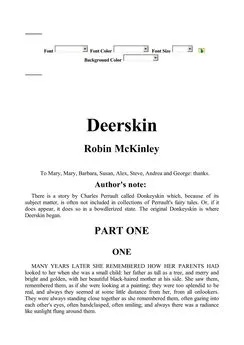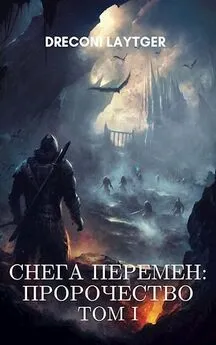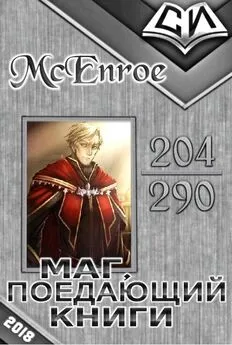Deerskin - Robin McKinley
- Название:Robin McKinley
- Автор:
- Жанр:
- Издательство:неизвестно
- Год:неизвестен
- ISBN:нет данных
- Рейтинг:
- Избранное:Добавить в избранное
-
Отзывы:
-
Ваша оценка:
Deerskin - Robin McKinley краткое содержание
Robin McKinley - читать онлайн бесплатно полную версию (весь текст целиком)
Интервал:
Закладка:
It was the best of Ash, that she be willing without thought to spend her life in defense of her person; and yet it was the worst of Ash too because it brought the scattered fragments of her person into a single, thinking, self-reflective, self-aware human being again, who saw and recognized what was happening, and her part in it.
As Ash leaped, Lissar sat up and cried, "No!"-for she saw the gigantic hands of the invader reach out for her dog, like a hunter loosing a hawk in the hunt, with that swift, eager, decisive, predatory movement. And she saw the one huge hand seize the forelegs of her dog, and for all the power of that leap, that threw the both of them around by the force of it, the invader kept his arm stiff, keeping that snarling face well away from him, where she could waste her fury only on his armored forearm. And in a blink, as the leap was completed, he seized Ash's hind legs with his second hand, and as she sank her teeth uselessly into his wrist, with the momentum of her leap, he grasped her legs and hurled her against the wall.
It was an extraordinary feat of strength and timing; almost a superhuman one. But it was not only the wall Ash struck, but the protruding frame of the door, and her head caught a pane of window-glass, and Lissar heard the sickening crack her dog's body made beneath the shrillness of breaking glass; and she screamed and screamed and screamed, her throat flayed with screaming in the merest few heartbeats of time, till her father stripped off his great gauntlets and left them on the floor beside the broken body of her dog, and strode the few steps to her bedside, and seized her.
She could not stop screaming, although she no longer knew why she screamed, for grief or for terror, for herself or for Ash, or for the searing heat of her father's hands which burnt into her like brands. Unconsciousness was reaching out for her, that bleak nothingness that she knew and should now welcome. But she had no volition in this or in any other thing, and she went on screaming, till her father hit her, only a little at first, and then harder, and harder still, beating her, knocking her back and forth across the bed, first holding her with one hand as he struck her with the other, first with an open hand, then with a fist, then striking her evenly with both hands, and she flopped between them, driven by the blows, still screaming.
But her voice betrayed her at last, as her body had already done, and while her mouth still opened, no sound emerged; and at that her father was satisfied, and he ripped off her the remaining rags of her shift, and did what he had come to do; and Lissar was already so hurt that she could not differentiate the blood running down her face, her throat, her breasts, her body, from the blood that now ran between her legs.
And then he left her, naked, on her bloody bed, the body of her dog at the foot of the broken window; and he left the chamber door open, and the garden gate as well.
The whole had taken no more time as clocks tell it than a quarter hour; and in that time he had spoken no word.
Lissar lay as he had left her, sprawled, her limbs bent awkwardly, her face turned so that one cheek touched the torn bedding; she could feel something curling stickily down her cheek, and the taste of blood was in her mouth. She knew where she was, and who, and what had happened to her, because her eyes could not stop looking at Ash's motionless body; starlight and moonlight glanced off the shards of broken glass, as if she lay in state upon a bed of jewels.
Lissar went on breathing as she looked, because she did not know how to stop; but as time passed she felt the cold upon her body, feeling it like a soft inquisitive touch, like the feet of tiny animals. She did not recognize pain as present experience, for such a distinction was too subtle for her now; rather it was that pain was what there was left of her, as screaming had been her existence some little time before.
The creeping cold was a change, or a further refinement, upon her existence. But the cold was not content to pat at her skin and then grasp her feet, her hands, her belly and thighs and face. It wormed its way inside her; but she could resist it no more than she had been able to resist her father. Nor, she found, did she now want to, for the cold brought oblivion, the cessation of pain.
And then she saw its face, and it was not an animal at all, but Death, and then she welcomed it. Almost she made her split lips work to give it greeting; but her voice had fled away some time before.
I am dying, she thought, in the guttering of consciousness, I am dying, she thought, in the encroaching cold stillness. I am dying, and I am glad, for Ash is already dead, and it will all be over soon.
PART TWO
TEN
SHE OPENED HER EYES RELUCTANTLY. SHE HAD BEEN CALLED
BACK from a very long way away. The coming back had been hard, and she had not wanted to do it; the leaving had been bearable only because she believed she would not return. She could not imagine what thing could have such urgency as to convince her to return-to permit herself to return, to make the choice to return-to her body. She had left it sadly, wearily, with a knowledge of failure, a consciousness of having given up; but also with a relief that flared out so bright and marvelous that as she fled from the battered flesh that had been her home for seventeen years, it shone more and more, till it looked not like relief at all, but joy. Joy! She wondered if she had ever known joy; she could not remember it. But if she had not, how could she know to put a name to it?
It was then that she felt the need to return from the bright, weightless, untroubled place where she found herself; it was then she knew someone was calling her, calling her from the old unhappy place she had just left. She was astonished-and then angry-that there was enough of her still attached to her life to listen: immediately to listen and, worse, to respond. In that bodiless, peaceful place there was that in her that moved in reaction to that call: like the needle floating freely in its bath choosing to acknowledge north. Did any other bits of that needle resist the pull; were there bits that did not understand it, that were themselves bent and shaped as their stronger sisters aligned themselves, pointing strongly, single-mindedly, north?
She remembered where she had learned about joy: she had learned from her dog, Ash. She and Ash had loved each other, played with each other, grown up together, been each other's dearest companion. It had been Ash only who had not left her, there at the very end of things, at the end of the princess Lissla Lissar.
And, for her loyalty and love, Ash had been killed. Lissar had no need to go back, because Ash was dead; and no one else had the right to demand she return.
But Ash was not dead. Ash was crouched by her person's bed, shivering, whining a tiny, almost subvocal whine, very deep in her throat, licking her person's bloody, swollen face, licking her wounded, bleeding body, licking, licking, licking, anxiously, lovingly, desperately; she was saying, Come back, please come back, don't leave me, I love you, don't die, please don't die, come back, come back, come back.
Lissar opened her eyes. Ash flattened her ears, began licking Lissar's face so wildly and eagerly that it was hard to breathe through her ministrations; the dog was trembling now more than ever, and her tiny whine, readily audible now, had risen in pitch.
Lissar found herself slowly fitting back into the rest of her body, as if consciousness were a fluid, as if the pitcher had been upturned at the tiny spot behind her eyes, and was now flooding downward and outward, from her eyes to her ears and mouth, then down her throat; again she knew her heart beat in her breast, again she knew she breathed ... again she knew that she hurt.
She became aware of how her arms and legs lay, of how her body was twisted, one leg bent under her, her head painfully forced to one side. And then, suddenly, she began to shiver; the numbness rolled back, and she was cold, freezing cold, paralyzingly cold. She discovered that she could make at least one hand move to her will, and so she moved it; she unclenched the trembling fingers, unbent the elbow, flexed the shoulder ... reached up to touch Ash's face. Ash made a little "ow!"-not quite a bark, not quite a whimper-and climbed up on the ruined bed, and pressed herself again against her person.
Her warmth made Lissar colder yet, as the last fragments of numbness shook themselves loose and left her, finally and absolutely, stranded in her body again; and, worse, lying passively on her bed with Ash next to her, lying fearfully and hopelessly and futurelessly, reminding her of...
She felt consciousness begin to curl up around the edgesher edges-and retreat, leaving a thick, terrifying line of nothing dividing her mind from her body. She took a great gulp of air, hissing through her teeth, and the shock of the sudden necessary expansion of her lungs, and the pain this caused her, jolted her mind and body back together again, though they met ill, as if two badly prepared surfaces ground together, not matching but clashing. She felt nauseated and weaker than ever, and very much afraid of the nothingness's next assault. She had decided to live. If she could not think of certain things, she would not think of them. There were other things to think of, immediate things.
She touched Ash's back, and her hand came away bloody; but she could not tell if the blood was her own or her dog's. How badly were they hurt? She did not know. She feared to find out.
She lay quietly, another minute or two, trying to gather her strength despite the dictatorial cold that shook her. She listened to the sound of two creatures breathing, a sound that, with the feat of listening, she thought she had given up, just a little time ago. The sound interested her from this new perspective, as it never had before.
Lissar knew they dared not stay where they were. They dared not because ... no, they simply dared not. She need not remember why; the instant choking crush of panic told her as much as she needed to know. And then there was the wind; there was a cold wind-the door must be open, the outside door to the gardenand she was naked and bloody on a bed that no longer had any comfort to give.
Ash was still shivering as well, and had thrust her nose, in a trick she had had as a puppy, as far under Lissar's shoulder and arm as she could get it; she made little determined, rootling motions now, as if, if only she could quite disappear under that arm, everything would be all right again. She made tiny distressed noises as she dug her nose farther under.
Lissar's shoulder hurt where Ash was joggling her with her excavations; but then her other shoulder hurt, and her head hurt, and her breast hurt, and her belly hurt, and her. . . no, she would not think about it ... though that hurt worst of all. Slowly, slowly, slowly, she brought the elbow belonging to the shoulder Ash was not burrowing under to a place that enabled her to sit up halfway.
The door to the garden was open, as she had guessed from the wind; but beyond that the door in the garden wall was also open. She had never seen that door open before; how strange. She had thought it buried under generations of ivy that held it shut with thousands of tiny clinging fingers. If it was open, then the tower room was no longer safe, for someone could come straight through the garden door, and then to the tower door; anyone ... no, she would not think of it.
But there was something about the door she did need to think about, although it was hard ... so hard. . : her mind would not settle to the task, but kept trying to run away, threatening to escape into the strength-sapping nothingness again; what was it she needed to remember?
Читать дальшеИнтервал:
Закладка:








![Makenlo - Маг, Поедающий Книги. Главы 101-203 [некоммерческий перевод с корейского]](/books/1101097/makenlo-mag-poedayuchij-knigi-glavy-101.webp)

